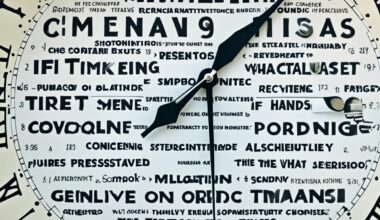Are you stuck in a pile of tasks and don’t know how to get your team to step up their pace in meeting deadlines?
Sometimes, finding the right words to communicate time constraints in a professional setting can be a challenge.
If you are working in a team, managing projects, updating clients, or sharing deadlines with your team, you must convey urgency and respect.
This writing will reveal different formal synonyms for tight schedule you can use to pass your message across clearly and get the job done and on time with absolutely no delays.
Why Use Formal Synonyms For Tight Schedule?
Using formal language has benefits that extend beyond just sounding sophisticated.
It helps you maintain a professional image
Clear, polished language helps you leave a positive impression. Choosing refined words shows that you respect the formality of business communication.
Helps convey urgency without pressure
Words carry weight and the use of certain expressions can unknowingly induce a tense environment.
Using formal synonyms for tight pressure can help you adjust your tone and focus while avoiding harshness altogether. It can let people know you’re busy without sounding rushed.
Adapting to the audience and context
Every situation demands a unique formal synonym. By knowing a wide range of synonyms, you can always adapt your language to suit emails, presentations, or meetings. This will help you adopt a communication style that fits each setting flawlessly.
In essence, the use of refined words shows that you understand the context and respect the formality of business communication.
With this understanding, let’s delve right into the nitty-gritty of the synonyms.
Top Formal Synonyms For Tight Schedule And How To Use Them
Here are some of the best formal synonyms for tight schedule specially selected for you.
1. Demanding Timeline
This refers to a schedule with strict demands, often used in project-based settings where deadlines are tight.
This is useful when addressing project stakeholders or teams, especially in high-stakes projects where the timeline requires focused attention.
For example; Given our demanding timeline, we may need to allocate additional resources to stay on track.”

2. Compressed Timeline
The term indicates a shortened or accelerated timeframe that necessitates faster progress.
You can use this expression in project meetings, email updates, or written reports. It conveys urgency without implying stress or overwhelming the reader.
For example; “We are operating on a compressed timeline, so prompt action on each task is essential.”
3. Constrained Schedule
A schedule that is limited by strict parameters, often beyond the speaker’s control, usually due to external factors that can help set realistic expectations. “Constrained schedule” is particularly useful in written reports or presentations.
You can say “Our constrained schedule requires us to prioritize high-impact tasks and streamline our approach.”
4. Accelerated Timeline
A timeline that has been sped up, often due to external demands or the need for quick results. It frames the tight schedule as a positive challenge, emphasizing productivity and focus.
This wording is useful in updates to clients or stakeholders.
For instance; We are on an accelerated timeline, and each team’s contribution is critical to our success.”
5. Stringent Schedule
This refers to a rigid, non-negotiable schedule, drawing attention to the strictness of time constraints.
“Stringent schedule” is often used in formal reports or high-level meetings. It’s ideal when you want to say that the schedule has little flexibility.
You can say “The stringent schedule requires that all team members adhere closely to deadlines.”

6. Limited Time Window
“Limited time window” suggests there is a narrow period available for completing a task.
This could be due to external factors like market conditions, seasonal requirements, or resource availability. It shows that the opportunity to act may be brief or non-recurrent.
The wording is ideal for project updates, presentations, or discussions where there is a specific date range to meet.
It’s particularly useful for initiatives tied to external timing, such as seasonal campaigns or event planning.
Example in Context: “We have a limited time window to launch this campaign, as it aligns with the holiday season.”
7. Restricted Timeframe
When time is strictly limited, “restricted timeframe” communicates this constraint. It signals that there will be very little flexibility and strict adherence to deadlines is necessary.
Use this term when discussing projects with strict or regulated timelines, where delays could have serious consequences.
This wording is effective in contexts that require planning and where adaptability may be low.
Example in Context: “With our restricted timeframe, every team will need to finalize their tasks on schedule to ensure smooth progress.”
8. Intensive Timeline
The term is excellent for scenarios where there’s a concentrated push toward project goals within a specific period.
“Intensive timeline” is particularly helpful when introducing a project with a short deadline, where team members may need to work at an accelerated pace.
Using “intensive” implies not just urgency but also a sense of teamwork and focus. It shows that the focus will need to be narrowed, with minimal distractions allowed.
Although the timeline may not be long, the work demands thorough attention to high-priority tasks.
Example; “Given the intensive timeline, we’ll hold daily check-ins to keep everyone aligned on priorities.”
Tips for Using Formal Synonyms for “Tight Schedule” Effectively
The right formal synonyms can elevate your communication, but knowing when and how to use them is key. Look at the guidelines below;
Match the Tone to Your Audience
Different phrases can convey different levels of urgency or strictness.
For example, “accelerated timeline” might suit a creative or startup environment, whereas “stringent schedule” could be better in a corporate setting.
Avoid Overusing the Same Term
Repetition will make you sound monotonous. Try mixing synonyms to keep your language fresh and engaging.
Be Clear and Direct
Professional language doesn’t need to be complicated. When using formal synonyms for “tight schedule,” keep sentences concise to avoid confusion.
Clear and straightforward sentences will make your message more effective, especially in an environment where everyone is busy.

The Effect
By choosing words that align with your audience and convey time constraints clearly, you can manage expectations, inspire confidence, and foster respect in every interaction.
These refined expressions enable you to communicate urgency without the rush, assert limitations with respect, and lead conversations with clarity.
Conclusion
Integrating these formal synonyms for “tight schedule” can transform your communication style and mark you differently.
It shapes perceptions and builds trust in both personal and professional realms.
Together, let’s craft a more polished, confident communication style that makes a lasting impact.
Share to inspire others.







